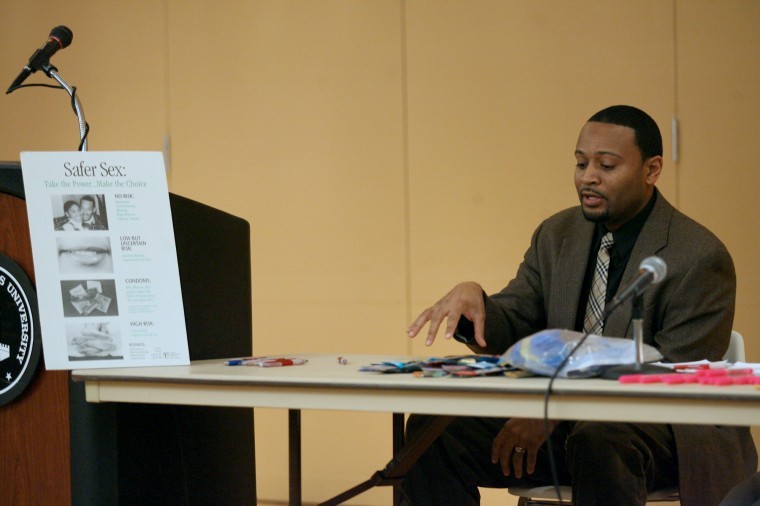AIDS decrease as financial cost of treatment rises
Dr. Allen Williams speaks at the National Black HIV/AIDS Awareness Day event Monday night at the Regency Room in the Holmes Student Center.
February 7, 2011
DeKALB | The human cost of HIV/AIDS is decreasing, but the financial costs of treatment are rising.
During an HIV/AIDS question and answer panel Monday night, Allen Williams, doctor of internal medicine, said less people are dying now from HIV/AIDS than were before because of medical advancements.
Those who are dying are the ones who can’t afford treatment, he said.
In the recession, less federal funding to states for programs like HIV prevention, testing, counseling, care and training means the cost to patients is rising, said Steve Lux, NIU senior health educator.
Williams said costs could be more than $10,000 per month for HIV pharmaceutical drugs. Costs are high because of the billions invested in research to develop the drugs.
“It’s much cheaper, easier, better to prevent [transmission of HIV],” Lux said.
The panelists stressed prevention through condom usage and safer sex practices.
Lux urged the crowd of about 30 students in the Regency Room of the Holmes Student Center to get tested themselves.
“There’s nothing wrong with being tested for HIV,” he said. “Everyone in this room should be tested.”
Williams said it is important for sexual health for patients to have a doctors they feel comfortable talking honestly with. He said if a patient feels judged by their doctor when sharing information, they should find a new one.
If a student tests positive for HIV, their local county board of health is a resource for information about funding treatment. Finding a doctor under a student’s health insurance defrays costs, Williams said.
The event kicked off the first full week of Black History Month events and was part of the 11th annual National Black HIV/AIDS Awareness Day. The event was sponsored by the Center for Black Studies, Sigma Gamma Rho Sorority, the Black Male Initiative and B.R.O.T.H.E.R.S.
HIV/AIDS disproportionately affects the African American community, Lux said.
Williams said the African American community accounts for 13 percent of the U.S. population and 46 to 48 percent of new cases of HIV each year.
Lux said on the NIU campus, African American students have a higher rate of condom usage than any other ethnicity.
And NIU students have a higher rate of condom usage than the national average.
Lux said an event like HIV/AIDS Awareness Day is an opportunity to spread knowledge about safer sex practices in regards to all sexually transmitted infections.
Though HIV is the highest profile sexually transmitted infection, Lux said, it affects many less people than do chlamydia, gonorrhea, and syphilis.
The panelists also dispelled myths surrounding the virus and disease. The HIV virus can only be spread through sexual intercourse and blood transmission, not through skin contact or mosquito bites.
In response to students’ questions, the panelists also explained that people do not die from AIDS, but from sicknesses like pneumonia or cancer that they contract because of a weakened immune system.
Students had the opportunity to submit questions anonymously by writing them on note cards, an aspect of the event that junior journalism major Constance Ervins said she appreciated.
Harold Raddle, senior mechanical engineering major, agreed that HIV/AIDS can sometimes be a topic students are shy about discussing.
“It’s a serious topic; it scares people,” Raddle said. “During the presentation the room got a little quiet, but it’s talk that needs to be heard.”
During the question and answer session, Williams also talked about the future of HIV/AIDS research.
Williams said he believes a vaccine will be developed for HIV/AIDS before a cure, similar to the way the Hepatitis B vaccine is now the norm.



